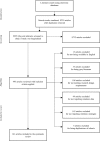Retention strategies in longitudinal cohort studies: a systematic review and meta-analysis
- PMID: 30477443
- PMCID: PMC6258319
- DOI: 10.1186/s12874-018-0586-7
Retention strategies in longitudinal cohort studies: a systematic review and meta-analysis
Abstract
Background: Participant retention strategies that minimise attrition in longitudinal cohort studies have evolved considerably in recent years. This study aimed to assess, via systematic review and meta-analysis, the effectiveness of both traditional strategies and contemporary innovations for retention adopted by longitudinal cohort studies in the past decade.
Methods: Health research databases were searched for retention strategies used within longitudinal cohort studies published in the 10-years prior, with 143 eligible longitudinal cohort studies identified (141 articles; sample size range: 30 to 61,895). Details on retention strategies and rates, research designs, and participant demographics were extracted. Meta-analyses of retained proportions were performed to examine the association between cohort retention rate and individual and thematically grouped retention strategies.
Results: Results identified 95 retention strategies, broadly classed as either: barrier-reduction, community-building, follow-up/reminder, or tracing strategies. Forty-four of these strategies had not been identified in previous reviews. Meta-regressions indicated that studies using barrier-reduction strategies retained 10% more of their sample (95%CI [0.13 to 1.08]; p = .01); however, studies using follow-up/reminder strategies lost an additional 10% of their sample (95%CI [- 1.19 to - 0.21]; p = .02). The overall number of strategies employed was not associated with retention.
Conclusions: Employing a larger number of retention strategies may not be associated with improved retention in longitudinal cohort studies, contrary to earlier narrative reviews. Results suggest that strategies that aim to reduce participant burden (e.g., flexibility in data collection methods) might be most effective in maximising cohort retention.
Keywords: Attrition; Cohort; Drop-out; Engagement; Follow-up; Longitudinal; Retention.
Conflict of interest statement
Ethics approval and consent to participate
Not applicable.
Consent for publication
Not applicable.
Competing interests
The authors declare that they have no competing interests.
Publisher’s Note
Springer Nature remains neutral with regard to jurisdictional claims in published maps and institutional affiliations.
Figures
References
-
- Rothman KJ, Greenland S. Cohort studies. In: Rothman KJ, Greenland S, Lash TL, editors. Modern epidemiology. Philadelphia: Lippincott Williams & Wilkins; 2008.
-
- Rothman KJ, Greenland S, Lash TL. Modern epidemiology. 3. Philadelphia: Lippincott Williams & Wilkins; 2008.
Publication types
MeSH terms
Grants and funding
LinkOut - more resources
Full Text Sources
Miscellaneous


